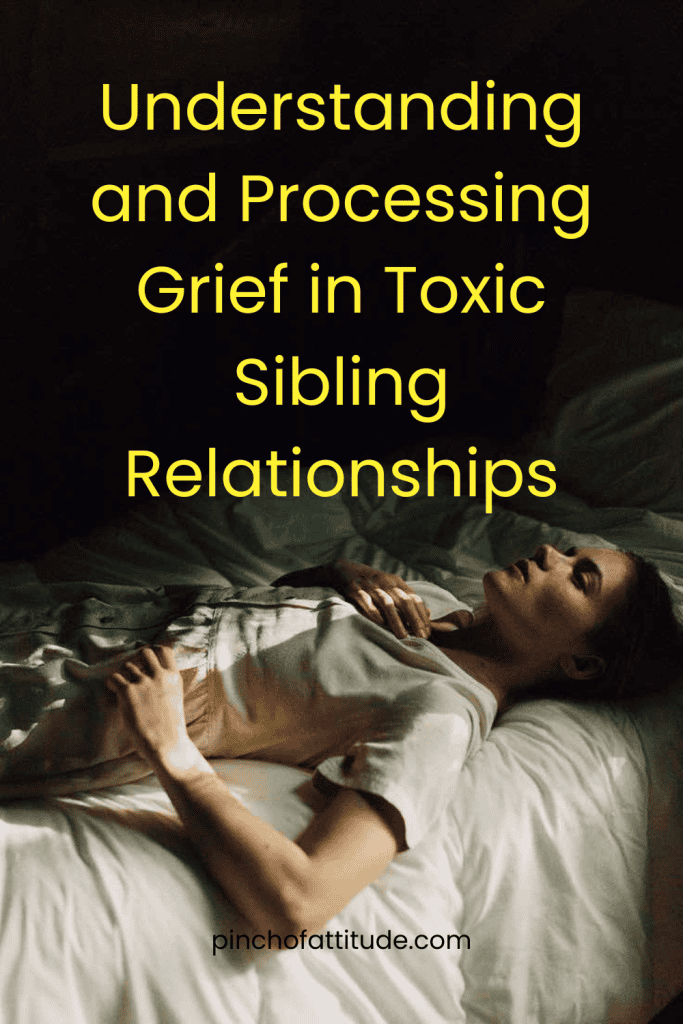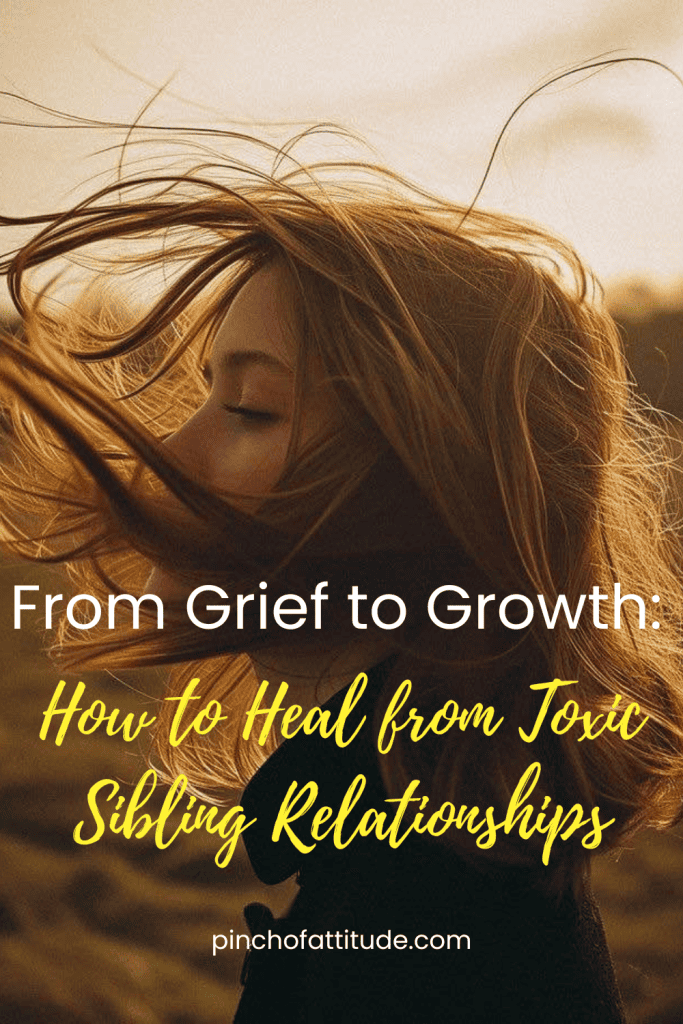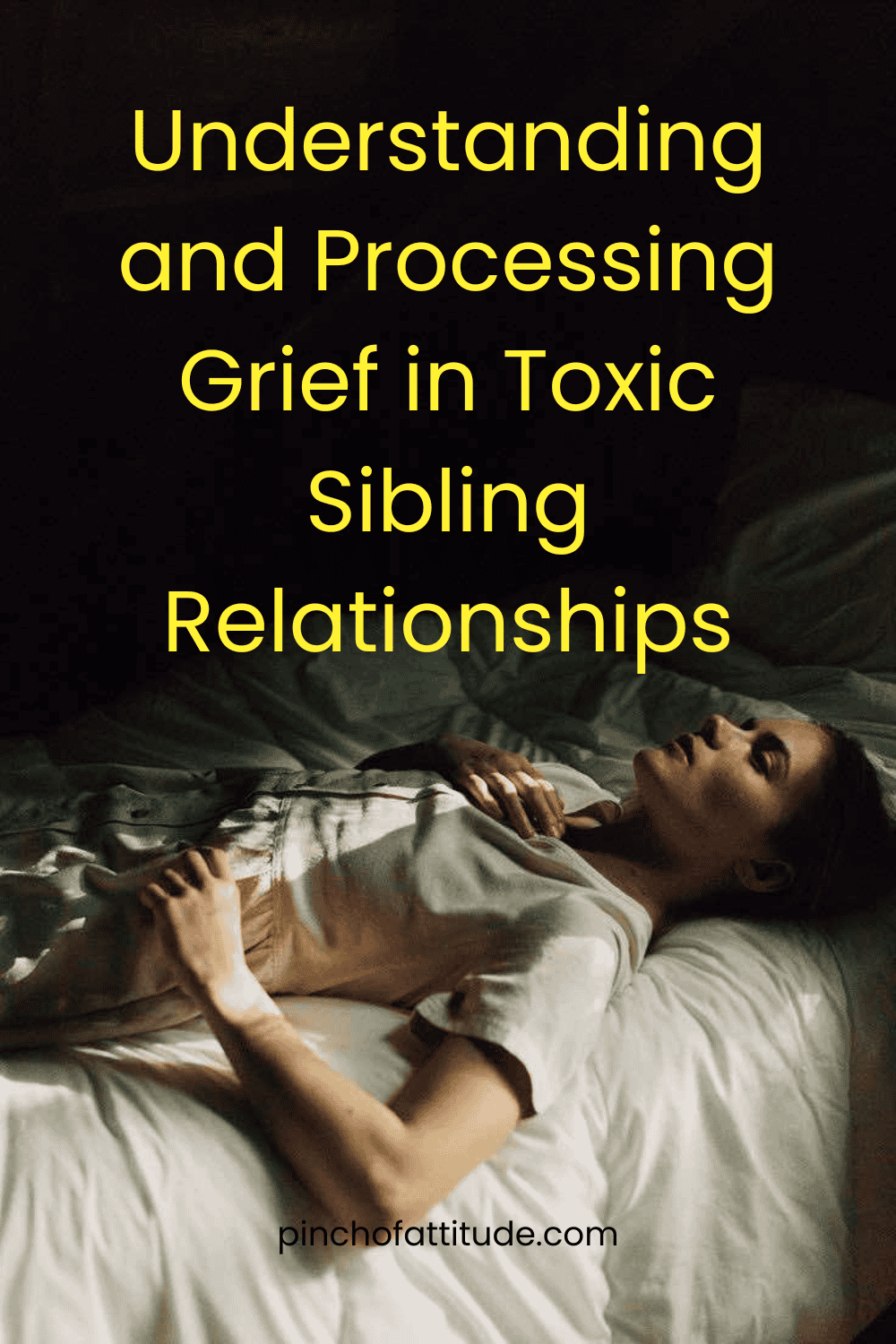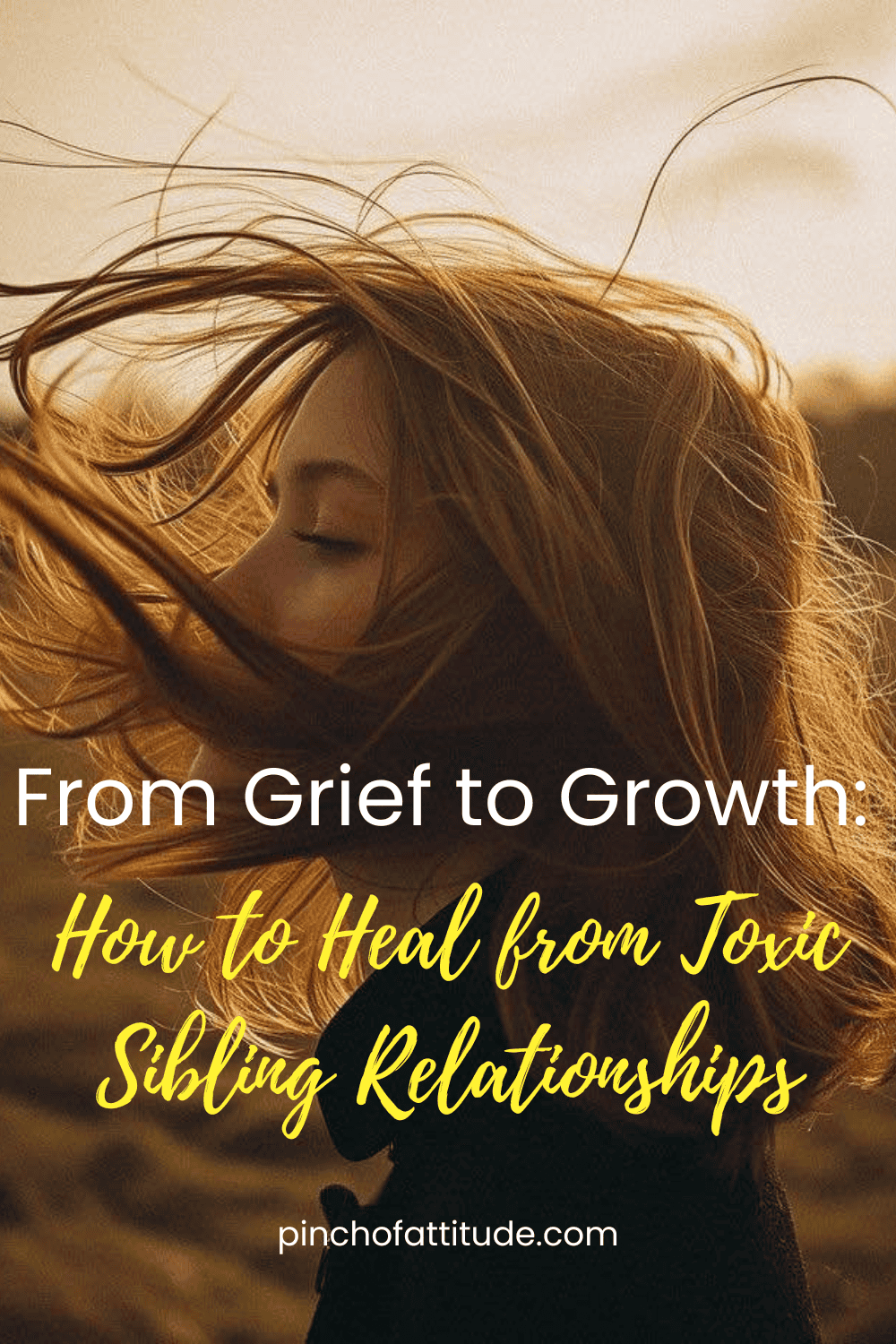Dealing with a toxic sibling can really take a toll on you, you know? It’s like lugging around this weight that never seems to lighten up, no matter what.
For me, I realized I couldn’t just tough it out and move on with my life. I needed to give myself the space to really understand and process my feelings, especially grief.
Grief is not just about mourning a loss in the usual sense, it’s also about coming to terms with what you missed out on – a supportive, loving sibling relationship.
Ignoring or burying these emotions only made things worse for me. Once I allowed myself to face my grief head-on, it was amazing how much lighter I felt.
Taking that time to acknowledge and work through my feelings was key to healing and moving forward.
If you’re going through something similar, continue reading as I’ll share some ways to handle grief during sibling toxicity.
- Validating your emotions is the first step towards healing and understanding how toxic sibling experiences have impacted you.
- Treat yourself kindly and allow space for healing without self-judgment
- Instead of waiting for external closure or validation from toxic siblings, shift your focus inward towards personal growth and inner peace.
Table of Contents
8 Ways to Handle Grief in Toxic Sibling Relationships

When I was dealing with the pain of a toxic sibling, I found comfort in some unexpected places – like a cozy cup of tea, a good hug from a friend, or just jotting down my thoughts in a journal.
These little acts of self-care really helped me ride out the emotional rollercoaster.
Here are eight practical ways to cope with the grief that comes with toxic sibling relationships:
1. See How it Hits
Grief can hit you from all angles in a toxic sibling dynamic – whether it’s feeling let down, emotionally abused, being neglected, or even betrayed.
I’ve experienced all of those from my siblings and even my mother. I really had it rough, you know?
When you’re facing this kind of relationship, it’s important to acknowledge how these experiences have affected you emotionally.
Tip
Give yourself the space to recognize these emotions so you can start addressing the pain. But it’s totally okay not to have everything figured out right away.
2. Giving Yourself Permission to Feel
It’s completely fine to feel all sorts of emotions – sadness, anger, confusion, or even a bit of relief, you name it.
Your feelings are valid, no matter what anyone else might think about your relationship with your sibling.
It’s important to give yourself permission to feel these emotions because they’re a big part of your healing process.
Don’t push your feelings away or be hard on yourself for feeling a certain way. Just go through what you’re feeling so you can get yourself back on track.
3. Treat Yourself Kindly
Take it easy on yourself as you go through grief. Give yourself room to feel without being too hard on yourself, yes?
Do stuff that makes you feel good and calm. For instance, go for long walks, put on some relaxing tunes, or just chill out when you need to.
Tip
Being kind to yourself and showing some compassion is key to looking after yourself during this tough period.
4. Talk to Someone You Trust
It can really help to talk about how you’re feeling with close friends, family, or a therapist you trust. They can give you some perspective and let you know you’re not alone in this.
When I turned to a trusted therapist many years ago, it really helped me process my emotions and understand what I was going through.
It was like a weight off my shoulders and it made me feel stronger over time.
Getting that support from people who care about you can be a game-changer in your healing process. So, lean on your trusted allies whenever you need to.
5. Prioritize Your Healing Journey
Healing from a tough sibling situation isn’t a quick fix. Take it slow and make yourself a priority by spending time on things that feed your soul and help you heal.
Activities like jotting down your thoughts, getting into mindfulness, or trying out new hobbies can help you bounce back emotionally.
6. Make Peace With the Past, You Must!
Sometimes, you might not get closure, especially if your sibling isn’t willing to address the past.
Instead of waiting around for that closure or validation, shift your focus to finding peace within yourself.
Accept the situation for what it is and put your energy into your own growth and happiness.
In my case, I lost contact with my siblings years ago so I didn’t really get the closure I wanted with them.
It’s really sad, I know. But I focused on my personal growth and building healthy relationships with people who love and understand me.
That’s the peace I got, and I am not even complaining, because I know that that’s the peace I actually need.
Tip
When you stop waiting for things to resolve externally, you give yourself the power to move forward and shape a bright future for yourself.
7. Unburden Your Heart
Forgiving doesn’t always mean you have to reconcile with someone. It’s more about freeing yourself from resentment and letting go of that emotional weight.
Find ways to unload your heart in healthy ways – try art, music, or writing. Being creative can really help you process those feelings and let them out in a positive way.
8. Embrace Change and Growth
Take this as a chance to look within and grow personally.
Figure out what you can manage (like how you react and your own boundaries) and what’s out of your hands (like your sibling’s actions).
Embracing change means putting your energy into your own progress and evolution. Set up new boundaries, try out new activities, and build up healthy relationships that lift you up.
Tip
When you focus on your growth, you give yourself the strength to handle this tough situation with resilience and a positive outlook.
Why is It Important to Work Through Grief in Toxic Sibling Relationships?

When you’re dealing with grief in toxic sibling situations, it can hit you in unexpected ways.
Ignoring this feeling can really weigh you down and impact how you feel and even your other relationships.
So, why face it head-on? Here’s why it matters:
- It helps you heal. The first step toward healing is recognizing and accepting your grief. Pushing those feelings aside just prolongs the pain.
- It prevents emotional baggage. Unresolved grief can create emotional baggage that messes with your self-esteem and overall happiness. Processing it helps lighten that load.
- It clears the path to forgiveness. Grief often comes with resentment or anger. Dealing with it can open the door to forgiveness, whether toward your sibling or yourself.
- It promotes healthy boundaries. Understanding your grief helps set healthy boundaries. You’ll figure out what behavior is okay and what you won’t stand for in future interactions.
- It opens space for healthy relationships. Addressing your grief can create room for healing not only within yourself but also possibly in your relationship with your sibling if things align.
- It avoids repeating patterns. Ignoring the grief could lead you to unknowingly repeat toxic patterns in other parts of your life.
Taking steps to work through this pain is important for reclaiming your emotional well-being and building healthier connections in your life.
Challenges You Might Face While Processing Grief From a Toxic Sibling Relationship
One of the toughest parts in understanding and processing grief from this situation is facing the reality of a strained sibling relationship.
It’s like grappling with the fact that the person who should have had your back is causing you pain instead.
That realization can stir up a mix of emotions – betrayal, confusion, you know, those things.
Dealing with toxic dynamics can leave deep scars that mess with how you see yourself and trust others.
So, what challenges might pop up along the way? Here are some:
- Denial and Minimization: It’s super common to downplay how much the toxicity affects us or convince ourselves it’s not a big deal, which can stall the healing process.
- Guilt and Self-Blame: Many of us end up blaming ourselves for the messed-up relationship, even though the toxicity often stems from deeper issues within our sibling.
- Fear of Confrontation: Confronting these issues head-on can feel scary, especially if you’re worried about more drama or being shut out.
- Navigating Family Dynamics: The wider family setup can complicate things, making it tricky to set boundaries or find support.
- Emotional Rollercoaster: Dealing with this stuff means riding a wave of emotions ( anger, sadness, moments of clarity, and acceptance) that can be totally overwhelming.
Getting through all this takes guts and self-kindness.
It’s okay to take it slow and lean on others for support. Remember, healing is a journey, and every step forward shows how strong and resilient you are.
Related Posts:
- Why Grieving After Narcissist Abuse Is Quintessential?
- How I Managed Anger and Resentment Towards My Toxic Siblings?
- How I Developed a Strong Self-Identity While Dealing With My Toxic Sibling?
- Cultivating Your Inner Confidence Against Sibling Toxicity
- Healing Emotional Scars After Sibling Toxicity: How I Did It!
Frequently Asked Questions
Why is it important to acknowledge your emotions in a toxic sibling relationship?
Acknowledging your emotions is crucial because it allows you to address the pain and begin your healing journey. Ignoring these feelings can prolong your suffering and impact your well-being.
How can I begin to heal from a toxic sibling relationship?
Start by giving yourself permission to feel all emotions—sadness, anger, confusion. This self-compassion is vital for your healing process and overall emotional well-being.
What should I do if I can’t get closure from my toxic sibling?
Instead of waiting for closure that may never come, focus on finding peace within yourself. Redirect your energy towards personal growth and building healthy relationships with supportive individuals.
How can creative outlets help in processing grief from toxic sibling relationships?
Engaging in art, music, or writing can be therapeutic, allowing you to unload your emotions in a positive way. These creative activities aid in processing feelings of resentment and hurt.
Why is it important to work through grief from toxic sibling relationships?
Processing grief helps in reclaiming emotional well-being and setting healthy boundaries. It also prevents unresolved emotions from negatively affecting other aspects of your life.




